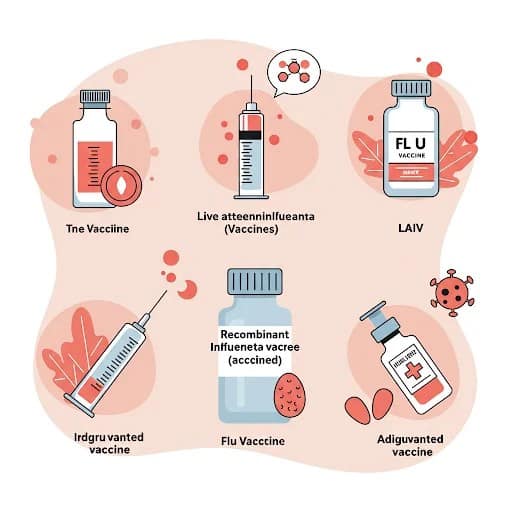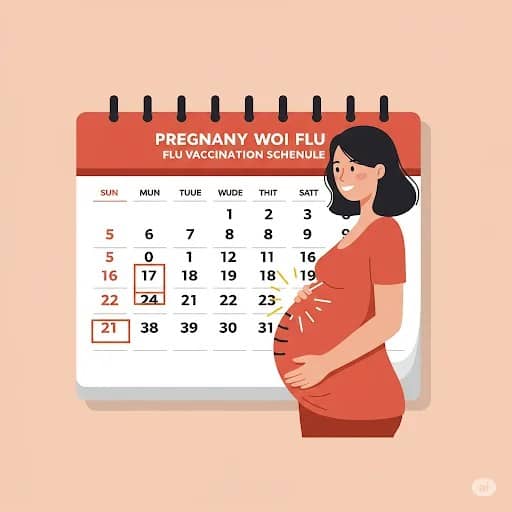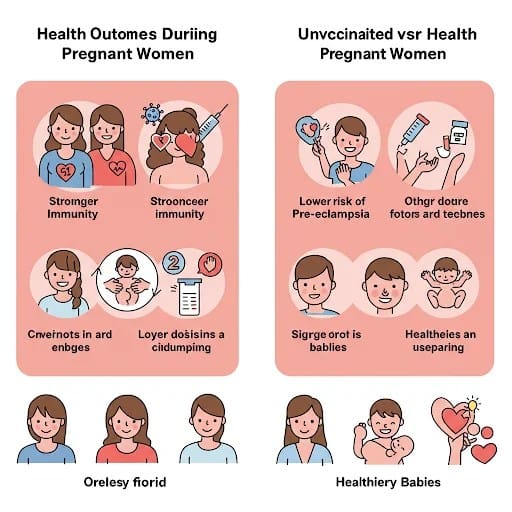Intro
Is it safe to get the flu vaccine in pregnancy? This is a question many expectant parents understandably have. Protecting your health and the health of your baby is a top priority during pregnancy. Let’s explore the safety and benefits of receiving the flu vaccine while you’re expecting.
Understanding the Flu and Pregnancy

The flu, or influenza, is a contagious respiratory illness caused by influenza viruses. It can cause mild to severe illness, and at times can lead to serious complications, even death. During pregnancy, your immune system changes. These changes can make you more susceptible to severe illness from the flu. This is in comparison to women who are not pregnant.
If you get the flu while pregnant, there’s a higher risk of complications for your baby. These complications include preterm labor and delivery. That’s why understanding how to protect yourself is so important.
Safety of the Flu Vaccine During Pregnancy
Extensive research and numerous studies have consistently shown that the flu vaccine is safe for pregnant mothers and their babies. Leading health organizations worldwide recommend flu vaccination during any trimester. The Centers for Disease Control and Prevention (CDC) is one of them. The World Health Organization (WHO) also endorses this recommendation.

The flu shots given to pregnant mothers are inactivated vaccines, meaning they do not contain any live flu virus. Therefore, they cannot cause the flu in you or your baby. The most common side effects are mild and short-lived, such as soreness, redness, or swelling at the injection site. Some people may experience a low-grade fever or body aches, but these usually resolve within a day or two.
Benefits of Flu Vaccination During Pregnancy
Getting the flu vaccine during pregnancy offers significant benefits for both you and your baby.
For you, it significantly reduces your risk of getting the flu. Even if you do get the flu after vaccination, the illness is likely to be milder. It is also less likely to lead to serious complications. This protection is crucial because flu-related complications can sometimes require hospitalization and can even be life-threatening for pregnant individuals.

For your baby, the benefits extend beyond your own health. When you get vaccinated during pregnancy, your body produces antibodies. These antibodies can cross the placenta. They provide protection to your baby against the flu for the first few months of life. This is especially important because babies younger than 6 months cannot receive the flu vaccine themselves. This passive immunity offers a vital shield during their most vulnerable period.
Types of Flu Vaccines and Pregnancy

There are different types of flu vaccines available each year. The injectable flu shot, which contains inactivated viruses, is the recommended type for pregnant mothers. The nasal spray flu vaccine, which contains live attenuated (weakened) viruses, is generally not recommended for use during pregnancy. Make sure to discuss the available options with your healthcare provider to ensure you receive the appropriate vaccine.
Addressing Common Concerns
It’s natural to have concerns about anything you introduce to your body during pregnancy. Some common concerns regarding the flu vaccine include worries about potential harm to the baby or the development of autism. Numerous scientific studies have thoroughly investigated these concerns.
They have found no link between the flu vaccine and adverse pregnancy outcomes. There is also no link to autism. The scientific consensus is clear: the flu vaccine is safe and beneficial during pregnancy.
The persistent myth linking vaccines to autism has been thoroughly debunked by numerous high-quality scientific studies conducted over many years. There is no credible scientific evidence to support this claim. Major medical and public health organizations worldwide have affirmed the safety of vaccines.
This includes the flu vaccine. They have also confirmed their lack of association with autism. Relying on scientifically sound information from reputable sources is crucial when making decisions about vaccination during pregnancy.
Addressing the challenges
Extensive research has addressed concerns about the vaccine causing other adverse pregnancy outcomes, such as miscarriage or stillbirth. It has found no evidence of such links. Studies indicate that flu vaccination during pregnancy does not increase the risk of these events. It may even protect against some negative outcomes related to flu infection.
It’s also important to remember that getting the flu during pregnancy carries greater risks. These are more significant than any potential risks from the vaccine. These vaccine risks have been proven to be minimal. Choosing not to get vaccinated leaves both the mother and the baby vulnerable to the potentially serious complications of influenza.
Another concern some pregnant individuals have is whether getting the flu vaccine will actually prevent them from getting sick. While the vaccine is highly effective, it’s not 100% guaranteed to prevent the flu. The effectiveness of the vaccine can change every year.
It depends on how well the vaccine strains match the circulating flu viruses. However, even if there’s a less-than-perfect match, the vaccine still provides some protection. It can reduce the severity of the illness if you do get sick.
Timing of Flu Vaccination During Pregnancy

The best time to get your flu vaccine during pregnancy is as soon as it becomes available in your area. You can receive the vaccine during any trimester – first, second, or third. Getting early in the flu season ensures that you and your baby have protection throughout the entire season. Flu seasons can vary in their start and peak. It’s generally recommended to get vaccine by the end of October. This is advisable if possible. However, vaccination later in the season can still be beneficial.
Flu Vaccine and Breastfeeding
The safety and benefits of the flu vaccine extend into the postpartum period as well. If you didn’t get vaccinated during pregnancy, it’s still safe and recommended to get the report while breastfeeding. The vaccine does not affect breast milk. It can help protect you from getting sick. It can potentially prevent passing the virus to your baby.
Who Should Get the Flu Vaccine During Pregnancy?
The recommendation is clear: all pregnant mothers should receive the flu vaccine, regardless of their health status. Certain underlying health conditions can increase the risk of serious flu complications during pregnancy, making vaccination even more critical. These conditions can include asthma, diabetes, heart disease, and weakened immune systems. However, even healthy pregnant individuals benefit significantly from vaccination.
What to Expect During and After Vaccination
The Typically administered as an injection in the arm. The process is quick and generally well-tolerated. As mentioned earlier, the most common side effects are mild and localized to the injection site. You might experience some soreness, redness, or slight swelling, which usually goes away within a day or two. Serious allergic reactions to the flu vaccine are rare. If you have any concerns about allergies, discuss them with your healthcare provider before getting vaccine
Comparison of Flu Outcomes in Vaccinated vs. Unvaccinated Pregnant mothers

| Outcome | Vaccinated Pregnant Women | Unvaccinated Pregnant Women |
|---|---|---|
| Risk of getting the flu | Significantly lower | Higher |
| Severity of flu illness | Typically milder | Can be more severe |
| Risk of flu-related complications | Lower | Higher |
| Risk of hospitalization | Lower | Higher |
| Risk of preterm birth | Lower | Potentially higher |
| Protection for the baby | Yes, for the first few months | No direct protection from mother |
Conclusion: Protecting Yourself and Your Baby
Is it safe to get the flu vaccine in pregnancy? The overwhelming scientific evidence confirms that the flu vaccine is safe and highly recommended for pregnant mothers during any trimester. It provides crucial protection for both you and your developing baby, reducing the risk of serious illness and complications. Don’t hesitate to discuss any concerns you may have with your healthcare provider. Get your report to ensure a healthier pregnancy and a safer start for your newborn.
Call to Action
Take proactive steps towards a healthy pregnancy! Talk to your doctor today about getting your flu vaccine. Embrace the peace of mind that comes with protecting yourself and your precious baby.
Short Disclaimer: This article provides general information about the flu vaccine during pregnancy. Always consult with your healthcare provider for personalized recommendations and to address any specific health concerns.
Discover more from I-PICKS
Subscribe to get the latest posts sent to your email.


